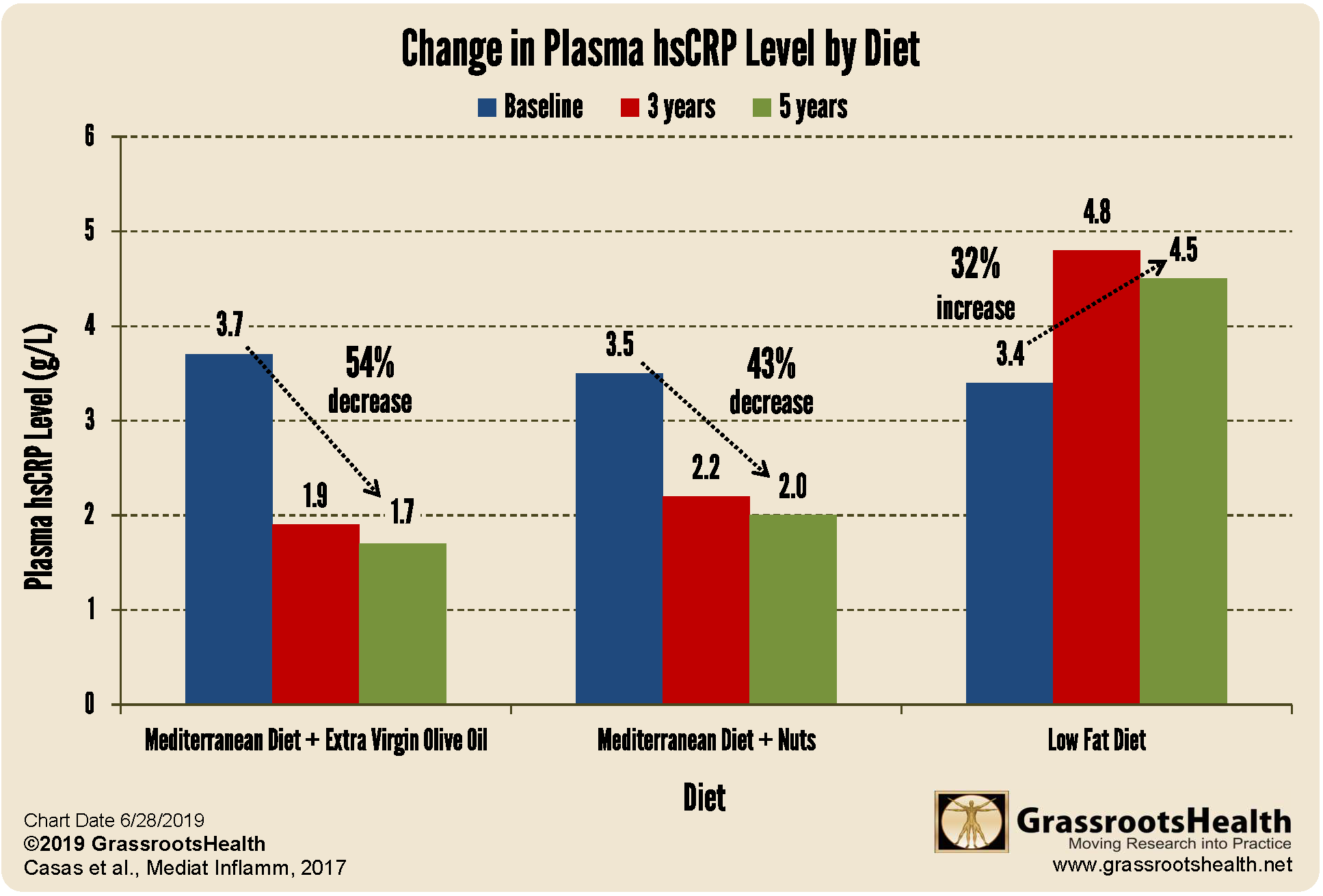Published on July 1, 2019
Inflammation is a normal, much needed part of the body’s healing process in response to cellular injury. However, chronic inflammation can cause or advance many chronic diseases, such as cardiovascular disease, metabolic syndrome, cancer, autoimmune diseases, and neurological diseases.
Previous posts by GrassrootsHealth have specifically covered vitamin D in relation to inflammation and mental health, and omega-3s in relation to inflammation and heart health, among others. Today’s post will focus on general dietary characteristics that have been shown to decrease inflammation and lower levels of inflammatory markers, specifically high-sensitivity C-reactive protein (hsCRP).
How Can Diet Affect Inflammation?
Several different nutrients and compounds, such as polyphenols, omega-3 fatty acids, and antioxidant vitamins, have been shown to have anti-inflammatory effects, while others, such as some saturated fats, trans-fatty acids, and sugars, have pro-inflammatory effects. For example, antioxidants from fruits and vegetables inhibit inflammation-causing free radicals, and both antioxidants and omega-3 fatty acids inhibit the production of cytokines, which also contribute to inflammation.
What Does an Anti-Inflammatory Diet Look Like?
An anti-inflammatory diet may include foods that
- are low in refined carbohydrates (such as sugar, white bread, white rice, etc.)
- are high in soluble fiber (such as whole grains, fruits, vegetables, legumes, etc.)
- are high in mono-unsaturated fatty acids (such as nuts, avocado, olive oil, etc.)
- have a higher omega-3 to omega-6 ratio (such as fatty fish, flax seeds, spinach, etc.)
- are high in polyphenols (such as dark berries, cherries, grapes, dark chocolate, etc.)
Mediterranean Diet Shown to Reduce hsCRP
 There is much research showing the correlation between diet and inflammation, such as that done by Casas et al. on the Mediterranean diet (MedDiet). This particular study demonstrated the effects of diet on inflammation among 165 participants who had a high risk of cardiovascular disease. The participants were randomly split into three groups and had to follow a specific diet for 5 years: one group was put on a MedDiet supplemented with olive oil, another on a MedDiet with nuts (walnuts, almonds, and hazelnuts), and one on a low fat diet.
There is much research showing the correlation between diet and inflammation, such as that done by Casas et al. on the Mediterranean diet (MedDiet). This particular study demonstrated the effects of diet on inflammation among 165 participants who had a high risk of cardiovascular disease. The participants were randomly split into three groups and had to follow a specific diet for 5 years: one group was put on a MedDiet supplemented with olive oil, another on a MedDiet with nuts (walnuts, almonds, and hazelnuts), and one on a low fat diet.
The MedDiet diet generally consists of:
- high intake of fruits, vegetables, whole grains, nuts and legumes, with olive oil as the main source of fat
- moderate intake of fish, poultry and alcohol (particularly red wine, with meals)
- low intake of red and processed meats
What were the results of the study?
As you can see in the chart below, both groups on the MedDiet experienced decreased inflammation (as measured by hsCRP), while the low fat diet group did not.
In conclusion, this study demonstrated long-term, anti-inflammatory effect of the MedDiet, specifically among participants at high risk of cardiovascular disease.
What can you do with this information?
Do you know your levels of inflammation? Get a glimpse of the amount of inflammation in your body with the Inflammation Panel, offered by GrassrootsHealth. Measuring hsCRP and HbA1c along with vitamin D and omega-3s can provide a clue about how much inflammation exists in the body and whether additional changes should be made to decrease inflammation, with supplementation, dietary changes, or both. Log on to the shop (click the link below) to get your tests and see for yourself if your levels can be improved.
Make sure you track your results before and after, about every 6 months!
Click Here to Access the Shop Page
How can I track my diet and food intake?
To help you track your food intake, supplement use, and inflammation levels, GrassrootsHealth has created an online tracking system called myData-myAnswers. For each specific food and supplement, you can track what days you take it, how much, and many other details. You can also track your hsCRP levels over time. Check it out today!








